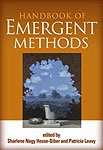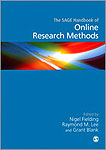Resources and Bibliography
As the Internet has become a force for social and cultural transformation, it has also become an arena for some of the most heated debates within social research. How can we conduct fieldwork in a space where the very notion of "field" is being redefined? How can we learn about communities when the concept of "community" is taking on new meanings?
 These questions and many more are part of an ongoing debate about the role of the Internet in social research. Organizations such as the Association of Internet Researchers have provided both methodological and ethical guidelines to the discussion of Social Research. One important document to check out is the Internet Research: Ethical Guidelines 3.0. Click on the link or the Download button to view this PDF. These questions and many more are part of an ongoing debate about the role of the Internet in social research. Organizations such as the Association of Internet Researchers have provided both methodological and ethical guidelines to the discussion of Social Research. One important document to check out is the Internet Research: Ethical Guidelines 3.0. Click on the link or the Download button to view this PDF.
This is a list of some of the most useful sources and reading on issues surrounding research on the Internet that I have come across. This is also a opportunity for you to send me suggestions for further research. Just email me any ideas that you may have for related articles or books and I will add them below.
Websites for Internet Researchers
Recommended Books
For your convenience, I have included the publisher supplied synopsis as well as a link to the book on Amazon for each one (and no I don't receive anything for recommending these books).
These books are increasingly dated. I will update the list in the future (hopefully not tooo distant) when I have a little time.
|
Online Social Research: Methods, Issues, & Ethics by Shing-Ling Chen, G. Jon Hall, and Mark D. Johns.
 Publisher Synopsis: Publisher Synopsis:
Online Social Research: Methods, Issues, and Ethics is a collection of essays by veteran online researchers who provide: (1) testimonial illustrations as to how traditional research methods may be modified for effective online research, as well as (2) the identification and discussion of critical issues and dilemmas encountered in online research. The former serves as a resource for teachers, students, and researchers who utilize online environments for information gathering. The latter is designed to stimulate ongoing debates and creative ideas about an as yet non-regulated arena of research. Online Social Research addresses online research which are practiced in the fields of communication, journalism, sociology, psychology, marketing, education, medicine as well as related disciplines that may have occasions to utilize surveys, interviews, and observations for information gathering in online environments. The book is designed as a text for research methods classes, as well as a resource for researchers, as it deals with methodological considerations one might well consider in developing an appropriate methodological approach.
|
The Handbook of Emergent Methods by Sharlene Nagy Hesse-Biber and Patricia Leavy.
 Publisher Synopsis: Publisher Synopsis:
Social researchers increasingly find themselves looking beyond conventional methods to address complex research questions. The Handbook of Emergent Methods is the first book to comprehensively examine emergent qualitative and quantitative theories and methods across the social and behavioral sciences. Providing scholars and students with a way to retool their research choices, the volume presents cutting-edge approaches to data collection, analysis, and representation. Leading researchers describe alternative uses of traditional quantitative and qualitative tools; innovative hybrid or mixed methods; and new techniques facilitated by technological advances. Consistently formatted chapters explore the strengths and limitations of each method for studying different types of research questions and offer practical, in-depth examples.
|
The Sage Handbook: Handbook of Online Research Methods by Nigel Fielding.
 Publisher Synopsis: Publisher Synopsis:
This handbook provides comprehensive coverage of contemporary and developing Internet and online social research methods, spanning both quantitative and qualitative research applications. The editors have brought together leading names in the field of online research to give a thoroughly up to date commentary on current debates. The chapters cover both methodological and procedural themes, offering readers a sophisticated treatment of the practice and uses of Internet and online research that is grounded in research methodology. Beginning with an examination of the significance of the Internet as a research medium, the book goes on to cover research design, data capture, the survey, virtual ethnography, and the internet as an archival resource, and concludes by looking at potential directions for the future of Internet and online research. The Handbook of Internet and Online Research Methods will be welcomed by anyone interested in the contemporary practice of computer-mediated research and scholarship. Postgraduates, researchers and methodologists from disciplines across the social sciences will find this an invaluable source of reference.
|
astandle@gettysburg.edu • Gettysburg College • (717) 337-6194
|

